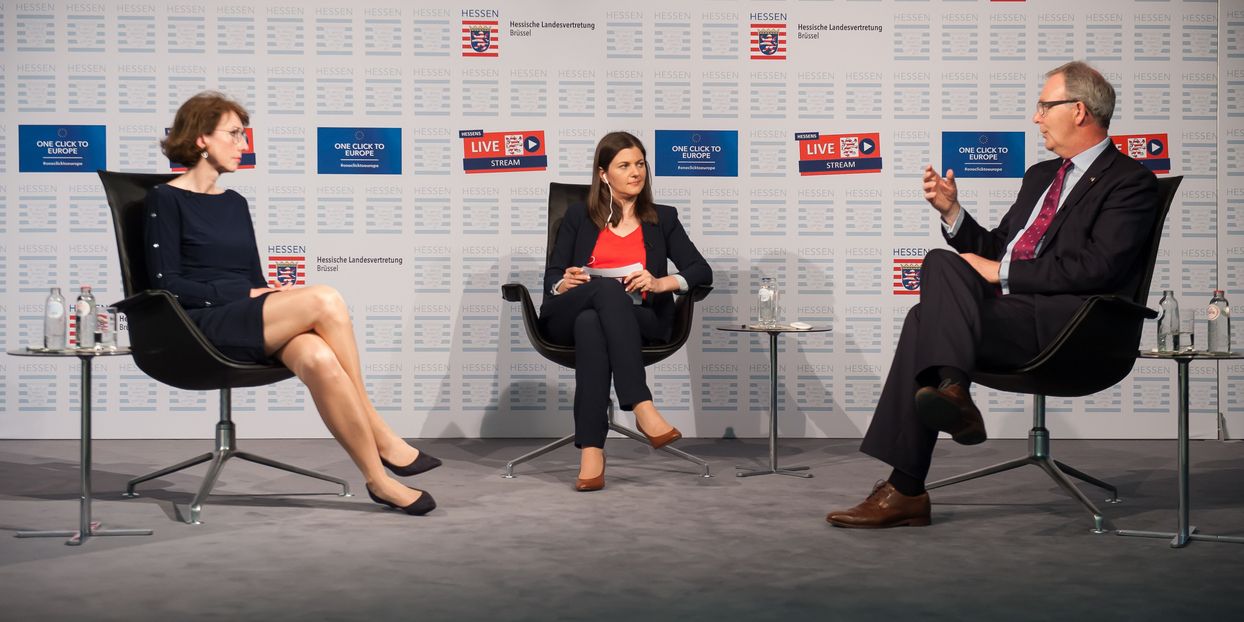
Gesundheitsdatenraum im Spannungsfeld zwischen medizinischer Versorgung, Forschungsfreiheit und Datensicherheit
Crisis Talk on 1 July 2021
"We are on the side of those who can provide their data, but do not have to." With these words, Mark Weinmeister, Secretary of State for European Affairs of the State of Hessen, welcomed the audience to the 18th Crisis Talk.
Under the titel "Health data space in the area of tension between medical care, freedom of research and data security", an explosive, highly topical subject was discussed, in which, as Stefan Kroll, the coordinator of the Leibniz Research Alliance "Crises in a Globalised World", emphasized in his welcoming words, "citizens must be involved".
The point of departure for this talk was the public debate about data security in the health care system and the role which the so-called European Health Data Space plays. Among other things, it is intended to enable patients to visit doctors throughout Europe without having to worry about the misuse of their sensitive, very personal data. One click to a doctor's appointment, online consultations – patients as well as practices are happy about the savings in phone calls. The pandemic fueled the search for medical teleconsultation options. However, problems also emerged, and the fears of citizens became apparent.
Once data is available, it can easily be accessed by the economy and the state.
Indra Spieker gen. Döhmann
Even a visit to the doctor is information that needs to be protected. A visit to a psychologist or a fertility center is not for the public, and employers or insurance companies should not be able to gain an insight into a person's medical history via the various visits to the doctor. But they already had it in Germany, for example, at least in theory: security experts reported at the Chaos Computer Club (CCC) congress at the end of 2020 how they gained access to millions of appointments, including doctor and patient data, because unknown hackers had leaked an extensive list of patient data from a doctor's appointment booking portal. How politics can react to such crises was one of the thrilled questions of the panel.
In the Crisis Talk, Axel Voss, CDU member and Member of the European Parliament, warned against exaggerated concerns on the part of politicians and citizens. According to Voss, the GDPR (General Data Protection Regulation) is "seen as a blueprint for the whole world," it is a "beautiful, holy law of global standard and therefore no one is allowed to touch it."
The creation of a European Data Space – including in the health sector – is one of the European Commission's priorities for the term 2019-2025, and is intended to provide efficient exchange and direct access to various health data (electronic health records, genomics data, data from patient registries, etc.) – not only in healthcare (primary use), but also in health research and policy (secondary use).
The GDPR is seen as a blueprint for the whole world.
Axel Voss
The Commission is therefore working with Member States to establish and develop the European Health Data Space. A new "Joint Action on the European Health Data Space" will support Member States and the Commission in exchanging health data for public health, treatment, research and innovation in Europe. For data to be exchanged securely, the various sources (electronic health records, registries, IT or digital tools) must be linked. This requires "interoperability between the different infrastructures and IT systems," stressed Yiannos Tolias, who represented the European Commission. The infrastructure at the European level builds on and is seen as an extension of existing initiatives such as the eHealth DIgital Service Infrastructure, the European Reference Networks and the genomics project.
In her keynote speech, Professor Indra Spiecker called Döhmann, from Goethe University in Frankfurt explained the interest of research in data: "Research with health data is ubiquitous". Pandemics and digitalization arouse covetousness for data – not only in times of crisis. Purpose limitation in data use is crucial, Spiecker said. "Once data is available, then there is easy access by business, by the state." She therefore pleaded for "clear regulation of access and access rights."
The EU could lead the way, as it already has in data protection and artificial intelligence, Spiecker appealed. The EU has limited capacities that have been transferred to it and therefore there are open legal "residual spaces" in the nation states. One brake is social security law, "where, as in tax law, the Member States reserve their own idiosyncrasies." Finally, Spiecker warned against the so-called flypaper trap, saying that "everybody does it" is "not a rule of wisdom, but a door opener for the interests of others." It would be difficult for individuals to protect themselves, she said, and politicians would have to see to that.
The 18th Crisis Talk ended with an appeal to European policymakers to both protect data and make it usable for the purposes of research and expanding health data infrastructures. It was the first Crisis Talk – organized by the Representation of the State of Hesse to the EU, the Leibniz Research Alliance "Crises in a Globalised World", the European Office of the Leibniz Association and the Research Alliance "Normative Orders" – that could take place in presence at the Representation of the State of Hesse for the first time since the beginning of the Corona pandemic.
Welcome
Mark Weinmeister
Secretary of State for European Affairs of the State of Hessen
Dr Stefan Kroll
Leibniz Peace Research Institute Frankfurt, Head of Science Communication
Keynote
Prof Dr Indra Spiecker genannt Döhmann
Goethe University Frankfurt
Panel discussion
Prof Dr Indra Spiecker genannt Döhmann
Axel Voss
Member of the European Parliament
Ioana-Maria Gligor (tbc)
Directorate-General for Health and Food Safety of the European Commission
Moderation
Lucia Schulten
Deutsche Welle Studio Brussels
